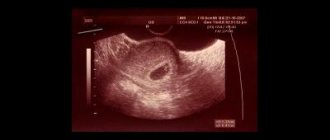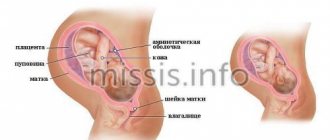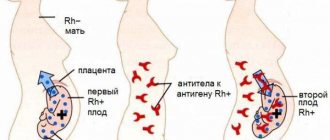The first trimester is over with its anxiety, morning sickness, constant sleepiness and other problems. If you count by week, the second trimester begins in the 13th week and is considered the easiest and calmest. The expectant mother has already adapted both psychologically and physically to her status, but it seems she is not yet close to motherhood. However, a lot of examinations are also awaiting.
A full range of laboratory tests is available at DILA: Program 185 “Examination of a pregnant woman at 22-24 weeks of pregnancy”, prenatal screening of the second trimester, prenatal non-invasive screening (NIPT, basic), as well as a number of other screening programs and mono-studies. All of them are aimed at determining the general state of health, the functioning of the main systems and organs of a pregnant woman in the second and third trimester of pregnancy. Regular monitoring will allow early detection of various complications that may arise and provide the necessary treatment. This increases the chances of a normal pregnancy and the birth of a healthy child.
Feelings of the expectant mother
The belly will become noticeably rounder, and already in the middle of the 2nd trimester of pregnancy, your position will become noticeable to everyone around you. Nausea, weakness and dizziness characteristic of the first trimester stop. We hope you feel full of strength and energy.
At this stage, the gynecologist will be able to palpate the uterus through the anterior abdominal wall. If at the beginning of the trimester its bottom is located 13 cm from the pubic joint, then by the end it rises by an average of 26 cm. Due to the pressure it exerts on neighboring organs, you may feel heaviness in the abdomen, heartburn, and shortness of breath.
Constipation during this period of pregnancy occurs due to eating disorders. Another factor is progesterone, which relaxes smooth muscles. Therefore, do not forget about fiber-rich foods and drinking regime.
Vaginal discharge
Normally they should be colorless or whitish, odorless or slightly sour. Consult a gynecologist if they suddenly acquire:
- yellow-purulent or greenish tint;
- curdled consistency;
- Strong smell.
These are possible symptoms of thrush or infectious diseases. In the second trimester of pregnancy, many medications are allowed to be taken, so it is easier to cope with the problem.
How to distinguish discharge from amniotic fluid?
The waters are completely transparent and liquid and are absorbed into the laundry. Leakage of amniotic fluid is a condition that requires immediate treatment at the hospital. Therefore, if you suspect rupture of the membranes, consult a gynecologist.
Second trimester: what doctors advise
You are not only accustomed to visiting an obstetrician-gynecologist every 2-3 weeks, but you are starting to look forward to these meetings, since each of them will allow you to find out how the pregnancy is progressing and whether everything is okay with the child’s development. Traditionally, questions regarding the activities of doctors are as follows.
- At what point in the second trimester is an ultrasound performed?
- A friend was recommended bed rest in the middle of her pregnancy - why?
- Why can't you sleep on your back? Which side is better to sleep on?
- What vitamins do you need more in the second trimester?
- Is it possible to have sex because your belly is getting bigger?
- I heard that a doctor may recommend compression stockings, for what?
At 22-24 weeks you will be advised to have another ultrasound examination. This is the time for the second screening to detect fetal developmental anomalies. In addition, the ultrasound will evaluate the condition of the cervix. There is no need for more frequent ultrasound examinations, except in cases where the doctor needs to clarify some unclear or alarming points, in particular if cervical insufficiency is suspected. If symptoms of isthmic-cervical insufficiency (insufficiency of the internal os of the cervix) are detected, you may be offered a special suture on the cervix to prevent miscarriage or premature birth.
To prevent disorders of the uteroplacental circulation, bed rest is recommended - lying on the left side for several hours a day. This will partly answer your question: “Which side is better to sleep on during pregnancy?”, However, this is not so important, the main thing is not on the stomach or on the back. Naturally, you will not sleep on your stomach due to the enlarging uterus, and it is not recommended to sleep on your back, since the growing uterus compresses the blood vessels located on the back surface of the abdominal cavity and disrupts the blood flow to the overlying organs (heart, brain), which causes a decrease in blood pressure, dizziness, even loss of consciousness. These phenomena are called “inferior vena cava syndrome” and they can become more pronounced in the third trimester.
Medication in the second trimester for a normal pregnancy consists of taking vitamin and mineral complexes containing (daily norm) 60 mg of iron, 0.4 mg (400 mcg) of folic acid, 50–150 mcg of iodine. In cases where the complex preparation does not contain a sufficient amount of the necessary substances, monopreparations are added to them, most often iron, iodine, and calcium. If allergic symptoms or other signs of vitamin intolerance appear in the second trimester, they are replaced by the appointment of individual most essential elements.
Progestagen drugs (Duphaston, Utrozhestan) are usually not used in the second trimester, but if symptoms of possible miscarriage persist, as well as to maintain placental function, these drugs in small doses can be prescribed in the third trimester. To ensure normal blood circulation in the placenta and prevent an increase in blood clotting potential, which is observed in some cases during pregnancy, Curantil and/or aspirin may be recommended. To prevent an increase in vascular tone, and therefore blood pressure, magnesium preparations in combination with vitamin B6 are recommended.
I want to emphasize that we are talking specifically about preventing pregnancy complications. Not only patients, but also not all doctors agree with the prophylactic use of drugs. The decision is up to the patient: whether she will use small doses and short courses of drugs with proven effectiveness or wait for complications to develop and then undergo serious treatment. Reasonable dosages and distribution of medications throughout the day will enhance their positive effects on the body and minimize possible side effects.
Sex in the second trimester of pregnancy is not limited in the absence of medical contraindications. Spouses usually experience special warmth and affection for each other and enjoy mutual caresses. Love each other, enjoy yourself, because in the near future you will have to focus on a new dear being who, to be honest, will interfere in your intimate sphere.
At the end of the second trimester, the state’s care for you is manifested in the fact that from 30 weeks paid leave is provided for 140 days, including the postpartum period. For women carrying twins or triplets, leave is given for 196 days. Maternity leave is given to a pregnant woman so that she can devote the last months directly to pregnancy, and therefore to her unborn child, her future happiness. The last months of pregnancy are no less important for its successful outcome than the first.
But still, the second trimester is the most pleasant time during the entire pregnancy, so your question is: “What should new clothes be for a growing belly?” - is quite appropriate.
Now in any city, even a small one, you can find a store or department specializing in clothes for pregnant women. The point, of course, is both beauty and elegance, but above all, the convenience and hygiene of the things that a woman needs while expecting a child. Let's start with the laundry. First of all, it should be loose enough and not tighten the woman’s body. It is advisable to choose panties from thin cotton fabric so that the skin of the external genitalia “breathes”, is not subject to diaper rash and abrasions, and therefore does not become infected. Of course, underwear needs to be changed daily. You should also avoid tight denim trousers, which also impede air circulation in the external genital area. And the jeans or trousers themselves, which exposed your navel and lower back, need to be put away in the closet until better times.
Maybe you are proud of your pregnancy and want to show off your wonderful belly to the whole world, but believe me, not all people are pleased to see it. In addition, in public places and transport, you risk getting infectious skin diseases. In the cold season, an open lower back can cause inflammation of the kidneys, since they are located in this area. Comfortable clothing for pregnant women are overalls and trousers, the front part of which is made of jersey or provides an increase in width due to additional belts and fasteners. Blouses and dresses widened at the bottom will not restrict your movements and will cover your belly with beautiful folds, emphasizing your femininity and the special charm of pregnancy.
It is advisable to use stockings and tights with slight compression properties. If you had venous insufficiency before pregnancy or developed with its onset, after consultation with a surgeon, you should purchase special compression stockings or tights. Wearing socks that tighten the shin can aggravate the violation of venous outflow from the lower extremities. The feet will still swell a little in the evening, so the shoes should not be tight, but you should not give up a small stable heel, as the load on the arch of the foot increases, and when wearing shoes with flat soles, pain may appear, especially for those who have flat feet. Thus, clothes and shoes for pregnant women should emphasize the charm of this period of a woman’s life, provide comfort, and protect from bad weather.
That's probably all there is to it regarding the second trimester. Let your pregnancy progress, you feel the beating of new life within you, rejoice in your happiness, but begin to prepare for the final stage.
Fetal development
During the second trimester of pregnancy, the baby goes a long way: if at the beginning of this period he weighs only 25 grams, then by the end his weight is 760 grams. The brain, nervous and skeletal systems are actively developing. The kidneys and bladder work, urine enters the amniotic fluid, which changes every three hours. Meconium is formed in the intestines - original feces, which will pass in the first days of the baby's life.
At 18-20 weeks of gestation, a woman will be able to feel the baby’s movements. If this is not your first pregnancy, this will happen sooner. The fruit turns over, somersaults. Reacting to your emotional state, he can become more active, experiencing with you.
Other developmental milestones in the second trimester
- The body is covered with lanugo - vellus hairs, which are involved in heat regulation and protect the skin along with vernix lubrication.
- The lungs produce surfactant, a substance that will help the alveoli open after birth so that the baby can take its first breath.
- The rudiments of milk and permanent teeth are formed.
- The baby has individual facial features, eyebrows and eyelashes, and developed facial expressions.
- The baby sucks his fingers and plays with the umbilical cord.
- By the end of the trimester, the child hears and distinguishes tastes.
Recommendation 5: limit visits to the sauna, avoid solarium
In the second trimester of gestation, it is better to exclude or limit visits to Jacuzzis, saunas, pools with water flows, and thermal springs, which can provoke premature birth.
Solarium is very harmful for pregnant women. Excessive exposure to ultraviolet radiation increases blood pressure, negatively affects the production of hormones, and reduces the concentration of folic acid, which is necessary for normal fetal development.
In addition, a sauna and solarium can cause overheating of the body, which is also dangerous for the fetus. Unlike the mother, the future baby cannot regulate its body temperature, since its sweat glands have not yet formed.
Tests and ultrasound
Visit your gynecologist once every 3 weeks, after passing a general urine test. Measuring your weight, waist circumference, fundal height, and blood pressure helps your gynecologist assess your health.
An important examination of this trimester is the second prenatal screening. It includes a thorough, detailed ultrasound and, in case of doubtful results, a blood test for hCG, AFP and estriol. The results will help identify pathologies in the structure of the internal organs of the fetus and the risks of developing chromosomal disorders.
What does ultrasound record?
An ultrasound examination at this stage is called morphological, because its purpose is a detailed study of the organs and systems of the fetus to assess the correspondence of their development to the gestational age. The specialist also studies:
- volume of amniotic fluid;
- to which wall of the uterus the placenta is attached;
- fetal heartbeat;
- blood flow in the umbilical cord.
At the end of the 2nd trimester of pregnancy, you will need to take a coagulogram - a blood test to evaluate your coagulation system. This is necessary to assess the possible risks of blood loss during childbirth.
SEX DURING PREGNANCY
In the second trimester of pregnancy, sexual activity becomes much more active than in the first, and libido increases. This is due to the fact that malaise and discomfort fade into the background, and the woman again begins to live a full life.
Contraindications for sexual intercourse include:
- risk of premature birth;
- threat of interruption;
- pain;
- placenta previa;
- infectious diseases of the genital tract and the stage of their treatment.
Your doctor will answer the question of whether sex is allowed for you.
Possible complications
In most cases, the second trimester of pregnancy is calm for mother and baby. Your condition may be overshadowed by discomfort in the lower abdomen, dizziness, and back pain. Be attentive to yourself and if you have the slightest doubt, contact a specialist.
Abdominal and lower back pain
Discomfort in the abdominal area may occur in the middle of the trimester. Due to the growing uterus, the load on the supporting ligamentous apparatus increases. Another reason may be increased uterine tone during pregnancy, when a woman feels like her stomach is turning to stone. If the pain goes away on its own, there is no need to worry. But if they are permanent and intensify, you should consult a doctor and undergo treatment in a hospital.
Due to a shift in the center of gravity, the load on the spine increases. To help yourself, wear a brace during long walks, choose low-heeled shoes, and do exercises to strengthen your back muscles.
Why is it important to monitor your blood pressure during pregnancy?
High blood pressure coupled with swelling can be a symptom of gestosis in pregnant women. This is a disorder in the functioning of the cardiovascular and urinary systems, dangerous to the life of the mother and fetus. Another symptom is the presence of protein in the urine.
With low blood pressure, when a woman suffers from headaches, dizziness and may even lose consciousness, it is prohibited to take traditional drugs for the treatment of hypotension. The doctor will advise you to adjust your lifestyle and diet, monitor your blood sugar and hemoglobin levels.
Daily menu for pregnant women
Correctly selected nutrition is an important component of the overall program of competent pregnancy management.
The menu should include:
- lean meat and fish;
- fermented milk products (homemade yogurt, cottage cheese, kefir);
- diluted juices;
- jelly and compotes;
- vegetable and butter;
- porridge with water and milk;
- a sufficient amount of fresh vegetables and fruits containing a lot of natural fiber (prevention of constipation and varicose veins);
- vegetables, steamed, stewed and baked (grilled).
Diluting fresh juices with water helps prevent heartburn and prevents indigestion and stool problems. Compotes are best made from seasonal fruits, berries and dried fruits.
The following should be excluded from diet during pregnancy:
- all harmful foods and semi-finished products (chips, crackers, etc.);
- fat meat;
- home canning;
- Forest mushrooms;
- smoked meats;
- low-quality sausages;
- spicy and too salty dishes;
- any products that contain artificial colors, preservatives and synthetic flavor enhancers;
- fried foods;
- any alcoholic drinks;
- products containing various allergens.
No medicinal herbal teas, tinctures, decoctions or any traditional medicine recipes should be used without a doctor’s prescription. Such drugs may contain components harmful to mother and child, for example, causing premature birth.
There is a common myth that the expectant mother should eat for herself and the baby. Overeating is a dangerous factor that leads to many complications! Food portions should be moderate. The main condition that determines a healthy diet is not the quantity, but the quality of the products consumed.
Do's and don'ts
Enjoy the second trimester of pregnancy, when all the ailments of the previous months are gone, and the small size of your belly still allows you to be active and mobile. Attend sports classes for expectant mothers, go swimming, sign up for childbirth preparation courses. If you've never done strength training before, now is not the best time to do it. If you are an experienced athlete, then pregnancy without complications is not a reason to interrupt your training. The only restrictions are contact sports, during which you can fall or get hit, as well as scuba diving.
Is it possible to communicate with pets?
Of course, you shouldn't get rid of your pets. However, it is better for a pregnant woman not to deal with rodents, because they carry the lymphocytic choriomeningitis virus, which is dangerous to the fetus. If you have reptiles, entrust their care to other family members during pregnancy, since turtles, snakes, and lizards can spread salmonella. Also, during the gestation period, you should not have cats to avoid infection with toxoplasmosis.
Is it possible to drink coffee during pregnancy?
200 mg of caffeine per day is considered harmless. This is 2-3 cups of instant coffee. But it is worth considering that caffeine is also found in tea and chocolate.
How many weeks and months are there in the second trimester?
Pregnancy is usually divided into three equal periods - three months each. The second trimester lasts from the 14th to the 27th week and is 14 weeks. In order not to get confused when calculating, you need to distinguish:
- embryonic period (true, beginning from the moment of fertilization);
- obstetric period (from the beginning of the last menstruation).
The obstetric gestational age is 40 weeks. An obstetric month is 28 days. The time from the day the last menstruation begins to the date of birth of the baby is the obstetric period. And the embryonic period is 38 weeks and is calculated from the moment of expected conception.
The embryonic period is approximately two weeks shorter than the obstetric period.
When the fusion of egg and sperm occurs, pregnancy occurs. Fertilization is possible only during the maturation of the egg or immediately after ovulation. Thus, calculating the gestational age from the moment of ovulation serves as the basis for calculating the embryonic period.
Let's explain with an example. The second trimester begins with the fourteenth obstetric week. It corresponds to the twelfth (embryonic) week of pregnancy, counting from the moment of conception. The 27th obstetric week is approximately the 25th week of embryonic development of the fetus.
How is it customary to determine the duration of pregnancy?
- According to the menstrual cycle. This is the most used method. Suitable for women with a regular menstrual cycle, when periods always occur at regular intervals.
- By the size of the abdomen/uterus and fetal movement. This is not always an accurate method, as individual factors play a role here. For example, the sensation of the baby's kicks depends on the woman's attentiveness and her personal threshold of sensitivity.
- By date of ovulation. Even assuming the day of egg maturation and knowing the date of sexual contact, it is impossible to say for sure whether conception occurred on that day.
An experienced doctor takes into account all factors and calculates the gestational age and expected date of birth quite accurately. All nuances are analyzed, including early ultrasound results, as well as hormone tests (human chorionic gonadotropin).
Nutritional Features
A pregnant woman's diet should be varied so that you can get all the necessary vitamins and minerals from it. They are better absorbed from food, and not from vitamin complexes. However, if you have systemic diseases, such as iodine deficiency, or do not consume dairy or meat products, talk to your doctor about taking a multivitamin.
During the second trimester of pregnancy, the fetal skeletal system develops, so be sure to include fermented milk products, cheeses, sesame seeds, and leafy greens in your diet so that neither you nor your baby suffer from calcium deficiency.
"Iron" diet
A common problem during this period of pregnancy is iron deficiency anemia. Because of it, immunity decreases, the tone of the uterus increases, drowsiness and dizziness occur. To prevent hemoglobin levels in the blood from falling below 110 g/l, be sure to eat 1 serving of meat per day. Include pomegranate, buckwheat, eggs, seafood, seeds and nuts in your diet. Iron is better absorbed together with folic and ascorbic acids, which are found in black currants, cabbage, gooseberries, rose hips, sweet peppers, and tomatoes.
Need for vitamins and microelements
For the normal course of the second trimester of pregnancy, it is necessary to give the body the entire complex of useful vitamins, nutritional components, macro- and microelements.
The need for vitamins and minerals increases by 30-40%. A lack of vital substances in a woman’s body can lead to serious disorders - fetal pathologies and even miscarriage.
The main complications caused by a deficiency of vitamins and minerals during pregnancy:
- Slowing growth and development.
- Failures in the process of formation of organs and systems (nervous, endocrine, digestive).
There are established norms for the consumption of these substances per day (according to the recommendations of WHO and RosPotrebNadzor).
Vitamins
| Tocopherol (E) | Normal – 17 mg
|
| Calciferol (D) | Normal – 12.5 mcg
|
| Retinol (A) | Normal - about 1000 mcg
|
| B vitamins | Thiamine (B1) Norm – 1.7
Riboflavin (B2) Normal – 2 mg
Niacin (B3/PP) Normal – 22 mg
Pantothenic acid (B5) Normal - about 6 mg
With a deficiency of B5, the risks of damage to the skin and mucous membranes primarily increase. Pyridoxine (B6) Normal - about 2.3 mg
Folic acid (B9) It is recommended to take it during the initial period of pregnancy planning (before conception). Pharmacy medications in strictly designated dosages must be taken by a woman throughout the entire period of gestation. The daily norm is about 600 mcg. The norm can be adjusted by a doctor.
|
| Ascorbic acid (C) | Normal – at least 100 mg
|
Microelements
| Iron | The need for microelements increases sharply, starting from the beginning of the second trimester of pregnancy. A deficiency of the element leads to anemia in the mother and child and the development of numerous complications. The daily norm is from 33 to 60 mg. The dose is determined individually by the doctor observing the woman. In some cases it can be increased to 120 mg. |
| Zinc | The norm per day is 15 mg. Deficiency leads to fetal malformations and an increased likelihood of premature birth. |
| Copper | Normal – 1.1 mg Promotes:
With a deficiency, the risks of developing the cardiovascular and skeletal systems and connective tissue increase. |
| Selenium | Norm – not less than 65 mcg Provides:
Selenium deficiency during pregnancy causes serious multiple pathologies of the joints, spinal column, upper and lower extremities, heart defects, etc. |
| Manganese | Daily norm – 2.2 mg Necessary for the formation of bones and connective tissue, ensuring the metabolism of many substances:
In case of deficiency, a number of disorders are diagnosed:
|
| Calcium | Normal - about 1300 mg The exact dosage is determined by the doctor and can range from 1500 to 2000 mg per day. The deficiency causes:
|
| Iodine | Normal - about 220 mcg Provides:
Iodine deficiency is primarily dangerous due to the formation of mental disability and developmental delays. |
| Magnesium | Normal – about 450 mg Ensures the normal flow of a number of important processes, these are:
Deficiency during pregnancy increases the risk of developing heart and vascular diseases and can lead to arterial hypertension. |
| Phosphorus | Norm – not less than 1000 mg Provides the following processes:
Deficiency leads to the formation of rickets, anemia, fragility of bones and teeth. |
Additional vital components
| Carotenoid lutein | Ensuring the normal functioning of the retina. The daily norm is 5 mg. |
| Bioflavonoid Rutoside (rutin) | Strengthening the walls of blood vessels. Prevention of edema. Prevention of varicose veins. The norm per day is about 30 mg. |
Deficiency of vitamins and microelements (three or more at a time) is found in almost 80% of pregnant women (information provided by the Research Institute of Nutrition of the Russian Academy of Medical Sciences).
When taking special vitamin supplements, dietary supplements and complexes for pregnant women, you should carefully read the instructions and use the drugs in precisely indicated dosages. You cannot adjust doses at your own discretion and violate the rules for taking medications! Neglecting your doctor's recommendations can lead to an overdose of medications and cause various complications, including severe allergic reactions.
Is it possible to replenish the deficiency of vitamins and microelements with food?
A balanced menu allows you to replenish your body with vital substances every day. But this is often not enough. Taking special medications prescribed by a doctor is the only correct solution for confirmed deficiency of minerals and vitamins.
Checklist for the second trimester of pregnancy
- Get a second prenatal screening from 16 to 20 weeks of gestation.
- Monitor your hemoglobin levels and eat foods rich in iron to prevent the development of anemia.
- Buy a special pregnancy pillow and sleep on your left side.
- To prevent complications from developing, get vaccinated against the flu before cold season.
- Choose comfortable, non-restrictive clothing for your growing belly.
- If you were planning to travel, then the second trimester is the best time: flights are absolutely not dangerous.
- Consider a maternity photo shoot: a rounded belly and good mood in the second trimester will help you.
- To prevent swelling, minimize your salt intake, which retains water in the body.
We invite you to classes at the School of Motherhood at the Women's Medical Center. Find out how to behave correctly during childbirth and how to care for a newborn. Chat with practicing obstetricians-gynecologists, pediatricians and other expectant mothers.
How to choose a maternity hospital?
Choosing the hospital where a woman is going to give birth is an important issue. It should be a place that provides good, professional care, comfort and a sense of security. Therefore, it is worth choosing a hospital for childbirth in advance. After visiting the most suitable facility, the following details should be discussed:
- Ask how much individual obstetric care costs, what medical interventions are available and how much they cost, whether family births are practiced, and whether showers/baths are available during labor. If possible, ask to see the delivery room and postpartum room.
- Determine whether the hospital is prepared for complications during childbirth - whether it has the necessary equipment to provide immediate care to the newborn and the woman in labor.
The conversation with the midwife and the overall impression that the expectant mother experiences after visiting the maternity and postpartum rooms often determine the final choice.
In the second trimester, psychological comfort sets in; you are accustomed to the idea that you will soon become a mother; plans are made for the future, when your beloved child will play a key role. To find out how your pregnancy and baby will develop further, read the article about the third trimester of pregnancy. We have also prepared a short checklist for you on what you need to do in the second trimester:
You can download this checklist from this link.
Herpes
A decrease in the functions of the immune system leads to the frequent appearance of symptoms of herpes on the lip during pregnancy in the 2nd trimester. The herpes virus, once in the blood, remains in the body in a latent state and manifests itself when the immune system is weakened and the body is under increased stress. The appearance of a cold on the lip during pregnancy in the 2nd trimester can be caused by hypothermia, emotional and physical fatigue.
Herpes during pregnancy in the 2nd trimester is treated with external medications based on acyclovir. In severe forms and acute symptoms, antiviral drugs are taken orally as prescribed by a doctor.
Cold
Colds during the 2nd trimester of pregnancy are a common occurrence, often caused by a decrease in the immunity of a pregnant woman. When the body's protective functions are reduced, acute respiratory infections and acute respiratory viral infections can cause a lot of trouble. The treatment of colds during pregnancy in the 2nd trimester must be approached carefully and comprehensively, not forgetting about caution in the selection of medications and therapeutic methods. Many medications for treating colds during pregnancy in the 2nd trimester are strictly prohibited.
How can you treat a cold during pregnancy in the 2nd trimester? Depending on the symptoms and nature of the disease, gentle pharmaceutical and folk remedies can be used to treat acute respiratory infections:
- Cough during pregnancy can have very unpleasant and dangerous consequences, so treatment and prevention should begin at its first manifestations. To treat cough, you can use herbal preparations and herbal medicine. It is useful to drink warm herbal teas (linden, chamomile, sage) with honey and lemon (in the absence of allergies); warm (but not hot) inhalations with medicinal plants and essential oils (tea tree, fir, mint, eucalyptus) are recommended. Compresses on the bronchial area will help speed up the removal of mucus (you can use a solution of dimexide in a ratio of 1:5 or cabbage leaf with honey). It is better not to take cough medicines without a doctor’s recommendation or choose herbal remedies - Mucaltin tablets, Bronchipret, licorice root syrups, marshmallow, sage.
- Runny nose. Pregnant women are not recommended to use vasoconstrictor medications for the common cold; it is better to use medications based on essential oils and sea water.
- Temperature. If a cold is accompanied by a fever, it should be brought down when the readings are above 37.5-37.7 degrees. You can reduce your temperature during the 2nd trimester of pregnancy with paracetamol-based drugs (Panadol). In extreme cases, when there is a high temperature or when paracetamol is ineffective, ibuprofen-based products (Nurofen) can be used.
How dangerous is a cold during pregnancy 2nd trimester? The danger of acute respiratory infections is that a strong cough causes increased muscle tension, including the abdominal and uterine muscles, which can lead to tone and hypertonicity. And these conditions are fraught with the threat of late miscarriage and premature birth. In addition, a cold during pregnancy in the 2nd trimester can have consequences in the form of disturbances in the development of the fetus, especially with a severe bacterial infection. It is better not to treat acute respiratory infections on your own, but to consult a doctor immediately.








